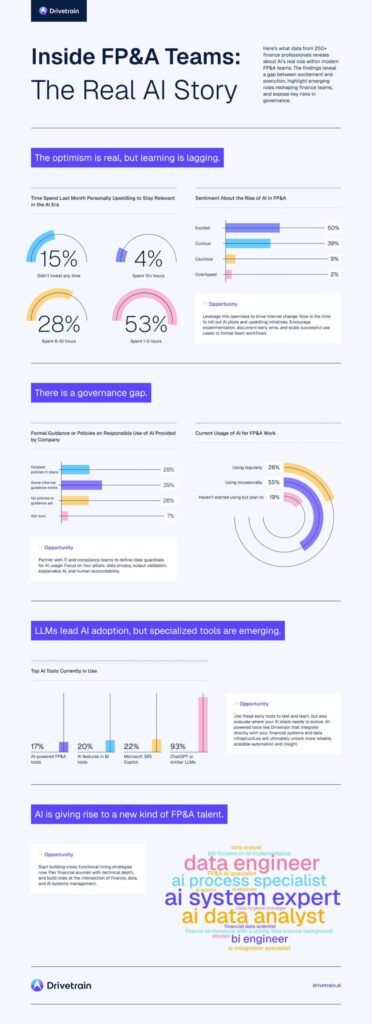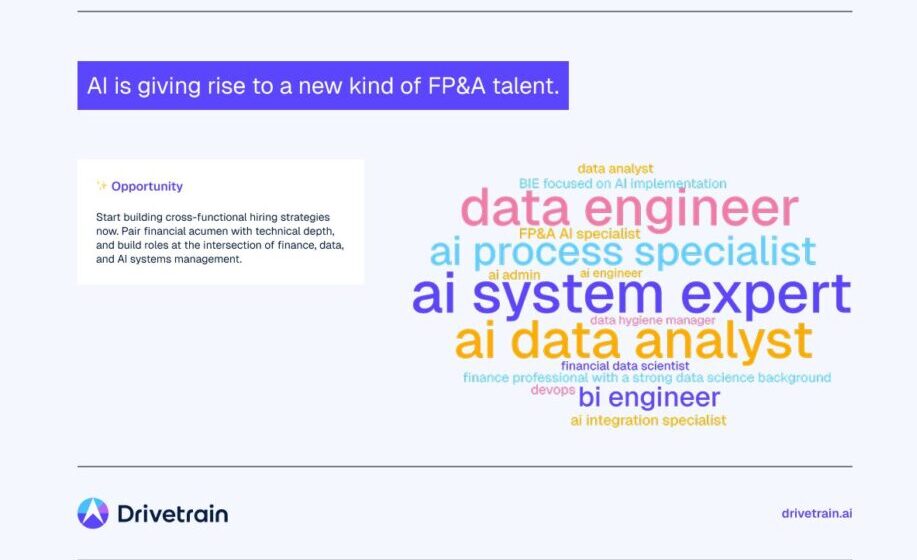Artificial intelligence has already redefined how businesses innovate, market, and serve their customers. From supply chain optimization to personalized healthcare, the transformative effects of AI are evident across nearly every industry. But in the world of corporate finance, a discipline often perceived as conservative and slow to adapt. AI is sparking an especially profound shift.
Drivetrain, an AI-native business planning platform, has just released its State of AI in FP&A report, a data-driven look into how financial planning and analysis (FP&A) teams are adopting artificial intelligence. Based on insights from 258 finance professionals, the report paints a picture of a function at a crossroads: enthusiastic about AI’s potential but still struggling to translate experimentation into meaningful transformation.
The Rise of the AI-Enabled Finance Team

According to the report, 79% of FP&A teams are already using AI tools. Yet most deployments are limited to what Drivetrain calls “quick wins”, that includes Excel automation, report formatting, and other surface-level efficiencies. The deeper disruption lies in hiring trends.
Finance leaders are now prioritizing roles such as AI Analysts and AI Systems Experts, signaling a future where technical talent becomes as critical as accounting expertise. “For the first time in decades, the most critical new finance hires won’t have finance backgrounds—they’ll have technical skills that barely existed when today’s CFOs started their careers,” notes Alok Goel, CEO and Co-founder of Drivetrain.
This evolution mirrors trends across industries. Just as data scientists have become indispensable in healthcare, logistics, and retail, finance is developing its own cadre of AI specialists who can build, interpret, and oversee intelligent systems.
Governance and Skills: The Achilles’ Heel of AI in Finance
Despite high optimism—90% of finance professionals express confidence in AI—Drivetrain’s findings reveal troubling gaps. Sixty-five percent of respondents reported spending less than five hours last month learning to use AI tools, and only 28% of companies have formal AI policies in place.
These figures echo broader industry patterns. Organizations are quick to adopt generative AI
platforms like ChatGPT or Google Gemini (which account for 93% of usage in finance), but slow to invest in structured governance or employee upskilling. The result: efficiency gains without long-term strategic resilience.
Beyond the Hype: Use Cases Driving Real Value
Drivetrain’s recent blog, 5 Generative AI Use Cases in Finance to Adopt Now, highlights where finance teams can move beyond experimentation and generate meaningful business value. Some of the most promising applications include:
-
Narrative automation: turning raw financials into board-ready commentary.
-
Forecast enhancement: using AI to enrich predictive models with real-time market signals.
-
Data reconciliation: dramatically reducing the hours spent chasing errors across fragmented systems.
These use cases demonstrate that AI is not just about working faster—it’s about working smarter, giving finance leaders the ability to focus on forward-looking strategy rather than manual clean-up.
A Call to Action for Finance Leaders
The State of AI in FP&A report serves as both a benchmark and a wake-up call. Experimentation is widespread, but true transformation remains rare. For finance leaders, the message is clear: AI will not replace finance teams, but it will redefine what skills, structures, and tools they need to thrive.
Enterprises that embrace governance, invest in AI-native platforms, and upskill their teams will be best positioned to capture AI’s full promise. Those that do not risk being left behind as the finance function evolves from number cruncher to strategic navigator of the AI era.
Drivetrain’s full report can be downloaded here: State of AI in FP&A Report | Drivetrain.



































